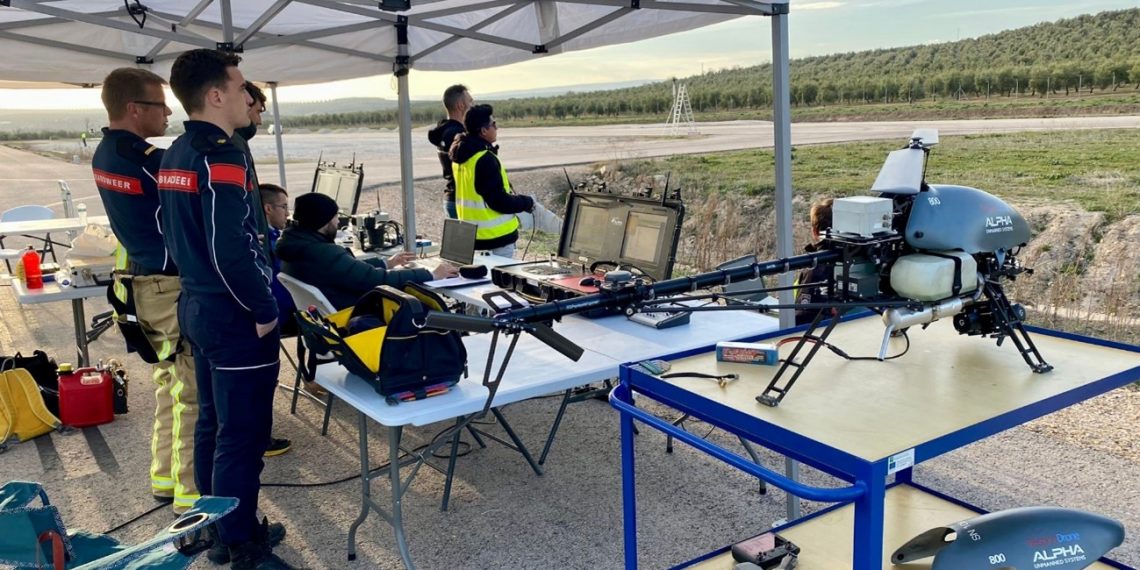Portuguese researchers created a drone-supported communication network to address natural disasters. The technology was developed by the Institute for Systems and Computer Engineering, Technology and Science (INESC TEC) – the only Portuguese partner of the international project ResponDrone – Situational Awareness System for First Responders. The project ended this year, and the Portuguese institute was responsible for developing the drone-supported wireless communication solution, which ensures contact between emergency teams on the ground and the command centres.
Developed to simplify and accelerate the assessment of natural disaster situations, information sharing, decision-making and operations management, the ResponDrone project ensures an innovative system that allows rescue teams to act more quickly, effectively, and efficiently during emergencies, saving more lives.
The project, which started in 2019 and ended this year, uses drones to support these operations, through a wireless communications solution that, even in cases of breaks in coverage and the need for capacity-building at the disaster site, maintains the connection between the rescue teams and the command centres
“In an emergency scenario, there are a lot of difficulties in managing the sources of information and making a quick evaluation of the situation (e.g., how a fire or flood is evolving), because there are no sensors on site that can provide this data”, explained Hélder Fontes, INESC TEC researcher. Moreover, there are communication-related issues: during natural disasters, these infrastructures are often affected and become overloaded or damaged. In these cases, “victims are unable to ask for help and emergency teams are prevented from correctly coordinating the resources they have on the ground”, he said.
When a natural disaster occurs in a larger area, emergency response teams need, as soon as possible, information on several aspects: state of the infrastructures, electricity grid, road access, exact location of the victims, etc. Hence, the development of an independent and dynamic communication infrastructure is extremely important. ResponDrone ensures that said information is collected, processed, and shared to guide rescue teams, monitor mission progress and support decision-making processes.
The work carried out by INESC TEC focused on an independent network infrastructure that can be assembled very quickly, thus adjusting to specific situations i.e., fires, floods, earthquakes, search and rescue missions, etc.
In addition to facilitating communication, drones are also prepared to carry video cameras, supplies, medicines, and systems that can detect the cell phones of people who are lost. The devices are designed to be used in a structured and integrated way in the airspace and can avoid collisions with other aircrafts operating in the region. Other benefits include the possibility of recalculating trajectories to avoid flying over people or fires, and the identification of people, vehicles, fires and flooded areas using artificial intelligence, in real time.
The technologies developed within the scope of the project also allow the same team to operate several drones; any member of the rescue team with the application installed can control the cameras on board, while watching the life feed.
Although the main goal was to support operations during emergency scenarios and rescue survivors, the ResponDrone system can also be “used as a tool to support actions to prevent natural disasters, such as patrolling forest areas and automatic fire detection”, said Hélder Fontes.
Now that the project is concluded, the team is working on transferring the system into the market. The goal is to sell the technology through an annual subscription, which guarantees its updating over time, depending on the identified needs.
The RESPONDRONE project was funded by South Korea and the EU, bringing together 20 partners from Germany, Israel, Spain, France, Korea, the Netherlands, Latvia, Armenia, Greece, Bulgaria, Portugal, and Belgium.




 News, current topics, curiosities and so much more about INESC TEC and its community!
News, current topics, curiosities and so much more about INESC TEC and its community!